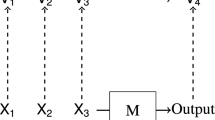Abstract
Nelson Goodman cast the ‘problem of induction’ as the task of articulating the principles and standards by which to distinguish valid from invalid inductive inferences. This paper explores some logical bounds on the ability of a rational reasoner to accomplish this task. By a simple argument, either an inductive inference method cannot admit its own fallibility, or there exists some non-inferable hypothesis whose non-inferability the method cannot infer (violating the principle of ‘negative introspection’). The paper discusses some implications of this limited self-knowledge for the justifiability of inductive inferences, auto-epistemic logic, and the epistemic foundations of game theory.
Similar content being viewed by others
References
Arnauld, A. and Nicole, P. (1662): La Logique ou l’Art de Penser. Reprinted by P. Clair and F. Girbal (eds.), Presses Universitaire de France, Paris, 1965
R.J. Aumann (1976) ArticleTitle‘Agreeing to Disagree’ Annals of Statistics 4 1236–1239
Bayes, T. (1764): A Method of Calculating the Exact Probability of All Conclusions Founded in Induction. Philosophical Transactions
G. Bonanno K. Nehring (1998) ArticleTitle‘On the Logic and Role of Negative Introspection of Common Belief’ Mathematical Social Sciences 35 17–36 Occurrence Handle10.1016/S0165-4896(97)00021-8
R. Carnap (1950) Logical Foundations of Probability University of Chicago Press Chicago
A.P. Dawid (1982) ArticleTitle‘The well-calibrated Bayesian’ Journal of the American Statistical Association 77 605–613 Occurrence Handle10.2307/2287720
A.P. Dawid (1992) ‘Prequential Analysis, Stochastic Complexity and Bayesian Inference’ J.M. Bernardo J.O. Berger A.P. Dawid A.F.M. Smith (Eds) Bayesian Statistics NumberInSeries4 OUP Oxford 109–125
de Finetti, B. (1931): ‘Probabilismo’, Logos 14, 163–219. (Translated by M.C. Di Maio, M.C. Galavotti, R.C. Jeffrey) in: ‘Probabilism’, Erkenntnis 31, 169–223
B. Finetti Particlede (1937) ArticleTitle‘La prévision: Ses lois logiques, ses sources subjectives’ Annales de l’Institut International de Statistique 7 1–68
Descartes, R. (1641): Meditationes de Prima Philosophia. Reprinted in C. Adam and P. Tannery (eds.), Oeuvres de Descartes, Vrin, Paris, 1996
W.D. Fitzgerald R.L. Smith A.T. Walden P.C. Young (2000) Nonlinear and Nonstationary Signal Processing CUP Cambridge
P. Gärdenfors (1988) Knowledge in Flux: Modeling the Dynamics of Epistemic States MIT Cambridge (Mass.)
Gelfond, M. (1987): On Stratified Autoepistemic Theories. Proceedings of AAAI–87, 207–211
K. Gödel (1931) ArticleTitle‘Über formal unentscheidbare Sätze der Principia Mathematica und verwandter Systeme’ Monatshefte für Mathematik und Physik 38 173–198 Occurrence Handle10.1007/BF01700692
N. Goodman (1955) Fact, Fiction and Forecast N.N London
G. Harman (1965) ArticleTitle‘The inference to the best explanation’ Philosophical Review 74 88–95 Occurrence Handle10.2307/2183532
G. Harman (1968) ArticleTitle‘Enumerative Induction as Inference to the Best Explanation’ Journal of Philosophy 65 529–533 Occurrence Handle10.2307/2024115
Harsanyi, J. (1967–68): ‘Games with Incomplete Information Played by Bayesian Players, parts I–III’, Management Science 14, 159–182, 320–334, 486–502
C.G. Hempel (1960) ArticleTitle‘Inductive inconsistencies’ Synthese 12 439–469 Occurrence Handle10.1007/BF00485428
D. Hilbert (1922) ArticleTitle‘Neubegründung der Mathematik: Erste Mitteilung’ Abhandlungen aus dem Seminar der Hamburgischen Universität 1 157–177
M. Hild R. Jeffrey M. Risse (1998) ‘Agreeing to Disagree: Harsanyi and Aumann’ W. Leinfellner E. Köhler (Eds) Game Theory, Experience, Rationality: Foundations of Social Sciences, Economics and Ehtics – In Honor of John C. Harsanyi Kluwer Academic Dordrecht 108–115
J. Hintikka (1962) Knowledge and Belief: An Introduction to the Logic of the Two Notions Cornell Ithaca (N.Y.)
R.A. Hirth M.E. Chernew E. Miller A.M. Fendrick W.G. Weissert (2000) ArticleTitle‘Willingness to pay for a quality-adjusted life year: In search of a standard’ Medical Decision Making 20 332–342
Hume, D. (1748): Philosophical Essays Concerning Human Understanding. Reprinted in L.A. Selby-Bigge and P.H. Nidditch (eds.), Enquiries Concerning Human Understanding and Concerning the Principles of Morals, 3rd edition, Oxford: Clarendon Press, 1975
Jeffrey, R.C. (2002): After Logical Empiricism. Colibri, Lisbon. (English edition with Portuguese translation by António Zilão)
H. Jeffreys (1939) Theory of Probability EditionNumber3 Clarendon Press Oxford
J.M. Keynes (1921) A Treatise on Probability Macmillan London
K. Konolige (1988) ArticleTitle‘On the Relationship between Default and Autoepistemic logic’ Artificial Intelligence 35 343–382 Occurrence Handle10.1016/0004-3702(88)90021-5
P.S. Laplace (1812) Theorie Analytique des Probabilités Courcier Paris
I. Levi (1967) Gambling with Truth Knopf New York
I. Levi (1980) The Enterprise of Knowledge MIT Cambridge (Mass.)
D. Lewis (1969) Convention: A Philosophical Study Harvard University Cambridge (Mass.)
D. Lewis (1973) Counterfactuals Blackwell Oxford
P. Lipton (1991) Inference to the Best Explanation Routledge London
D.C. Makinson (1965) ArticleTitle‘The Paradox of the Preface’ Analysis 25 205–207
G.E. Moore (1942) ‘A Reply to my Critics’ P.A. Schlipp (Eds) The Philosophy of G.E. Moore EditionNumber2 Tudor New York 533–677
R.C. Moore (1985) ArticleTitle‘Semantic considerations on non-monotonic logic’ Artificial Intelligence 25 75–94 Occurrence Handle10.1016/0004-3702(85)90042-6
S. Morris (1995) ArticleTitle‘The Common Prior Assumption in Economic Theory’ Economics and Philosophy 11 227–253 Occurrence Handle10.1017/S0266267100003382
S. Muggleton (Eds) (1992) Inductive Logic Programming Academic Press London
J. Neyman E.S. Pearson (1967) Joint Statistical Papers CUP Cambridge
K.R. Popper (1935) Logik der Forschung Mohr Tübingen
W.V.O. Quine J.S. Ullian (1970) The Web of Belief Random House New York
R. Reiter (1980) ArticleTitle‘A Logic for Default Reasoning’ Artificial Intelligence 13 81–132 Occurrence Handle10.1016/0004-3702(80)90014-4
N. Rescher (1964) Hypothetical Reasoning North–Holland Amsterdam
Russell, B. (1902): Letter to Gottlob Frege. Reprinted in J. van Heijenoort, From Frege to Gödel, Harvard University, Cambridge (Mass.), 1967, 124–125
D. Samet (1990) ArticleTitle‘Ignoring Ignorance and Agreeing to Disagree’ Journal of Economic Theory 52 190–207 Occurrence Handle10.1016/0022-0531(90)90074-T
E.Y. Shapiro (1983) Algorithmic Program Debugging MIT Cambridge (Mass.)
Stalnaker, R.C. (1980): A note on nonmonotonic modal logic. Technical report, Department of Philosophy, Cornell University
P. Teller (1976) ‘Conditionalization, Observation, and Change of Preference’ W. Harper C.A. Hooker (Eds) Foundations of Probability Theory, Statistical Inference, and Statistical Theories of Science. Reidel Dordrecht 205–259
V.N. Vapnik (1998) Statistical Learning Theory Wiley New York
A. Wald (1950) Statistical Decision Functions Wiley New York
L.Y. Yuan (1994) ArticleTitle‘Autoepistemic Logic of First order and its Expressive Power’ Journal of Automated Reasoning 13 69–82 Occurrence Handle10.1007/BF00881912
L.Y. Yuan J.I. You R. Goebel (1998) ArticleTitle‘Disjunctive Logic Programming and Autoepistemic logic’ Lecture Notes in Artificial Intelligence 1471 85–101
Author information
Authors and Affiliations
Corresponding author
Rights and permissions
About this article
Cite this article
Hild, M. Inductive Incompleteness. Philos Stud 128, 109–135 (2006). https://doi.org/10.1007/s11098-005-4059-6
Issue Date:
DOI: https://doi.org/10.1007/s11098-005-4059-6



